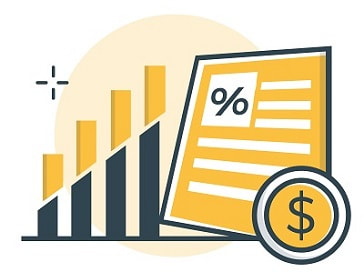Investing in Recession-Proof Sectors and Asset Classes During a Downturn
Maximise your investment portfolio during tough economic times by exploring recession-proof industries and asset classes. Our guide offers strategies for protecting your investments and highlights the best options for potential upside in a downturn.
Updated 5 April 2024
Summary
Our guide covers:
- With inflation racing ahead, global stock markets flat at best and rising mortgage rates putting pressure on homeowners, this is likely one of the most uncertain investing environments most New Zealanders have faced in recent times.
- However, there are some silver linings in the investment world. So-called "recession-proof" sectors can provide much-needed stability in these uncertain times. However, many of the best recession-proof investments can be illiquid, meaning you must hold on to them for a long time before selling them.
- If you're able to take a longer-term horizon, you can take advantage of a recession and build wealth at a time when everyone is panicking. However, it's not without its risks and you'll need to undertake thorough research.
Our guide covers:
MoneyHub Founder Christopher Walsh explains what a recession is and the meaning of 'recession-proof industries'
|
"Technically, a recession is defined as two consecutive periods of negative Gross Domestic Product (GDP) growth. However, most people use 'recession' as shorthand for tough business or living conditions. For example, the current rhetoric is that rising interest rates are putting pressure on mortgage rates and inflation, increasing living costs for New Zealanders".
"When it comes to investing, the best way forward is to diversify your portfolio as much as possible (if you haven't already). Some sectors tend to thrive in a recessionary environment, while others struggle - recession-proof industries are loosely defined as industries that exhibit defensive characteristics and will likely continue to operate robustly regardless of what happens to the wider economy or general business environment. Generally, recession-proof industries are those where demand stays relatively constant in all economic conditions". |
Christopher Walsh
MoneyHub Founder |
What are Recession-Proof Industries?
Consumer Staples (Food and Essentials)Consumer staples are the core essentials that many New Zealanders buy weekly. These are the “staple” products of our lives. Products like food, beverages, and household cleaning products are consumed in large volumes regardless of what’s happening in the economy.
During a recession, people don’t stop eating and drinking, so demand for these things stays steady. Additionally, they're essential items people are reluctant to give up, even in tough times. This characteristic makes them a popular choice for investors looking for a “recession-proof” investment. Generally, consumer staples are considered safe investments that pay a regular dividend. In addition, the price of consumer staples is usually stable given their relatively inexpensive nature and the likelihood for governments to support keeping costs on essential items to a minimum. Therefore, economic fluctuations don't affect consumer staples as much compared to other sectors (such as the luxury clothing industry). Key sub-sectors of the consumer staples industries include fast food and grocery chains. Listed examples of fast food companies include Mcdonald's, Starbucks, and Yum Brands (that owns KFC, Taco Bell and Pizza Hut, among others). Listed examples of grocery chain companies include Kroger, Walmart and Costco. |
Discount RetailersGenerally, recessions can mean that New Zealanders may lose their jobs or get their hours cut. This decision can pressure households to reduce expenditure on non-essentials but not cut them out completely. For example, when times are good, many people get accustomed to a certain lifestyle (such as travel). However, it can be extremely difficult to cut out all fun activities or experiences when money is tight.
The tougher it gets for New Zealanders, the more likely they are to shop at clothing or physical goods stores that are more inexpensive than they're usually used to. This behaviour is called “downgrading” their spending. So, for example, in a recession, New Zealanders may decide to shop at Pak'N'Save instead of shopping at New World or buy clothes from Hallensteins instead of Barkers. Although people will still consume products in most cases, they may spend less overall on those products than they normally would if the economy were booming. |
HealthcareWhether you're booking an online appointment to see your doctor or are getting a prescription for paracetamol, people still need to be healed, regardless of what's happening in the economy. The healthcare industry is incredibly broad and can include medical device companies, drug discovery companies and pharmacies. Generally, pharmaceuticals are seen as the most defensive healthcare companies, given people still need these essential goods to recover.
Some examples of listed healthcare companies include CVS Health, United Health and Green Cross Health. |
Utilities/TelecommunicationGenerally, essential services providers such as utilities and telecommunication companies are considered highly defensive and “recession-proof”. Regardless of what’s happening in the economy, people still want to connect. The need to call, text, and interact with others on social media all uses mobile data or cell reception that telecommunication providers provide. Additionally, people still need to keep warm at night or have clean running water in their households. As a result, utilities and telecommunication providers get relatively stable demand regardless of whether the economy is doing well or struggling. This characteristic makes them an ideal investment in recessionary times.
However, it’s important to know that the utilities and telecommunication sectors are impacted by other factors that can lead to increased volatility, such as the cost of energy. This was seen in Europe at the start of the the Russia-Ukraine conflict in 2022. |
Precious MetalsGenerally, commodities will outperform in high inflation or recessionary environments. This outperformance occurs because metals are considered a "store of value", meaning they retain value during periods of extreme volatility. However, it’s important to note that precious metals companies will be naturally more volatile when the price of the raw metal they're mining or using fluctuates.
This volatility is because these companies correlate directly to the price of the relevant precious metal in question. However, in a recessionary environment (especially with inflation running high), commodities (such as metals) are considered a haven as "they aren't making any more on earth", so they exhibit defensive traits. Note that this section does not include commodities in the context of the construction sector. While the construction sector uses materials and metals for building projects, the actual development of buildings and housing is highly cyclical and dependent on the broader economy. |
What are Recession-Proof Asset Classes?
Aside from selecting the right industries to invest in, selecting the right asset classes is also important. While stocks are the easiest and most common way to invest, there are other options for investors that want to outperform in a recession.
Art as an InvestmentIn a recession, art can be a robust investment. Because art is usually unique and not a commodity, it exhibits similar characteristics to metals in that it provides a "store of value" as they're supposed "not making any more of it". For example, Vincent Van Gogh's works of art are rare, and he isn't painting any more of those.
People have been buying art as an investment for thousands of years. People have started to view it as an alternative investment class in recent years. However, art can be a risky investment for some people. When buying art as an investment, you must be careful about what you purchase. It would help if you did some thorough research on the artist and artwork you're thinking of buying. You also need to make sure you're purchasing it at an affordable price. Buying art purely to resell later at a higher price is risky. It might appreciate, but there’s no certainty that it will. However, art appraisals are subjective and don't necessarily reflect economic fluctuations. Generally, if the overall economy is struggling, art prices may stay stable (as people still desire top-quality paintings, especially given the type of people who purchase art). Another benefit is that art is relatively uncorrelated to the broader stock market or economy (given it doesn't generate any revenue). As a result, art as an investment can be an easy and relatively safe way to diversify your portfolio. We recommend keeping a smaller allocation of your portfolio to art. Art prices can fluctuate wildly depending on the artist and type of art. A common way to invest in art is through shared ownership for those without millions of dollars to invest in a whole piece of art. Platforms like Masterworks are extremely useful for access to art with little to no minimum investment amounts. Please note, "art" does not include NFTs, which we argue to be at best a waste of money, and at worst, scams. |
Gold (and other Commodities)Gold is a common choice as a recession-proof investment. Many people consider gold the ultimate safe-haven investment, so it’s a very popular hedge to invest in during a recession. Other commodities such as silver, copper or platinum are also popular for recession-proof investments. The rationale for investing in gold and other commodities is that they are a store of value and "aren't making anymore", so they will usually rise in line with inflation or when volatility is high.
However, you should be careful when investing in commodities. They’re volatile and can have dramatic price fluctuations. So, they should only be seen as a longer-term investment rather than a short-term trade. It's almost impossible to predict what happens to the price of any given commodity over extremely short periods. More details: Our guide to investing in gold |
Real Estate Investment Trusts (REITs) / Commercial Real EstateREITs are a popular asset class to invest in during a recession. Because people still need a place to live and work regardless of the broader economy, REITs are seen as relatively safe, highly liquid (due to the REIT structure), and pegged to the value of the underlying property. This characteristic means they're unlikely to be as volatile as stocks and drop in value as quickly as some other investments.
Another benefit of REITs is that they generate reliable income from rent rolls. As a result, if inflation is high, office rents will usually increase in line with inflation. This characteristic means that REITs usually continue to outperform, even in tough economic conditions. There are different types of REITs that New Zealanders can invest in (either listed or unlisted). It’s recommended to research to find out which are best in different economic situations. More details: REIT guide |
Residential Real EstateAnother alternative to investing in commercial real estate / REITs is to invest in residential real estate. Similar to REITs, the rent charged to tenants usually increases in line with inflation. Residential real estate has similar characteristics to REITs, given people still need somewhere to live. However, when times are tough, vacancy rates for residential areas tend to increase as people downsize. Businesses that rent commercial properties are usually more insulated and tend to lock in longer leases (c. five to ten years) than residential tenants (that generally stick to one-year leases)
Cash flow-positive residential properties are extremely recession resistant, where the risk of defaulting on mortgage payments is lower given the high amounts of cash flow the property generates. However, it’s important to note that the price you pay for residential real estate matters. Just because residential real estate is more recession-proof than other sectors doesn't mean you can't lose money. For example, New Zealand's property market is considered one of the world's most expensive markets per this Bloomberg report. So, consider other considerations (like the price paid and the rental yield) before investing in residential real estate. More details: Investment Property Mortgages. |
Dividend StocksGenerally, companies that pay dividends are less risky than those that don't. During recessions, investors tend to move away from riskier stocks toward those that pay dividends. As a result, the stocks of companies that pay dividends tend to rise during recessions as investors increasingly look for steady cash flow. Dividends can provide much-needed cash flow to investors when incomes may be tight and rising living costs due to inflation. During economic downturns, companies tend to focus on increasing their dividends to retain investor interest.
Some sectors are more likely to have companies that pay dividends than others. For example, many companies in the technology sector don’t pay dividends, whilst most utilities, consumer and industrial companies pay regular dividends. Dividend payments are a strong indicator of a company’s health and ability to generate cash. Generally, dividend stocks are often seen as safer investments than those that don’t pay dividends. Although they’re not as recession-proof as some other investments (just because a company pays a dividend doesn't mean it is financially secure), they generally tend to do better in tough economic times. More details: Investing in dividend shares |
Must-Know Facts about Investing in a Recession
Accept that your investments may drop further after you’ve “bought the dip” and taken advantage of lower prices.
|
Some industries may be more recession-proof than others, but the perfect “recession-proof” industry doesn’t exist.
|
The weakening of the economy doesn't mean you should completely change your investing strategy.
|
Diversification is one of the best ways to ensure you survive the market volatility associated with a recession.
|
A recession-resistant industry doesn't necessarily mean it will be a great long-term investment sector.
|
Frequently Asked Questions
Why would I want to invest in recession-proof stocks/sectors? What’s the downside? Am I giving something up by investing in these stocks?
Recession-proof stocks are generally more defensive, meaning you may be less likely to experience substantial capital loss investing in these stocks compared to others. However, the positive qualities of recession-proof stocks in a downturn may also work against them in booming markets. Generally, defensive sectors like consumer staples will do well in recessions but don’t grow as fast as cyclical sectors (like the construction or technology sectors).
Recognise that most sectors will sit along a risk and returns scale, with higher-risk sectors being associated with higher returns (such as the technology or biotech sectors) and lower-risk sectors (such as recession-proof sectors) being associated with lower rewards.
Recognise that most sectors will sit along a risk and returns scale, with higher-risk sectors being associated with higher returns (such as the technology or biotech sectors) and lower-risk sectors (such as recession-proof sectors) being associated with lower rewards.
I’ve heard that cash is a good thing to hold in a recession because you can wait for the market to drop and buy stocks for cheap. Is this correct?
It depends. On the one hand, having an allocation to cash is important to have the money to take advantage of downturns. Holding cash in the short term can be useful when asset prices plunge, and you can take advantage of this by buying at rock-bottom prices. On the other hand, holding cash, it’s not a great long-term strategy due to inflation. If inflation were 5%, $1 of cash this year would effectively be worth 95 cents next year and 90 cents the year after. This example shows that inflation eats away at your purchasing power.
Cash is useful to have on hand as a quasi-emergency fund in case you lose your job or have any unexpected expenses. It’s recommended to have 3-6 months of living costs in case anything unexpected happens (to pay for essentials like rent, food, utility bills, essential medication or debt interest payments)
Cash is useful to have on hand as a quasi-emergency fund in case you lose your job or have any unexpected expenses. It’s recommended to have 3-6 months of living costs in case anything unexpected happens (to pay for essentials like rent, food, utility bills, essential medication or debt interest payments)
Why are recessions so bad? Are they worse than inflation?
Recessions are usually bad because they can lead to a negative growth spiral. This growth spiral is bad because it can become a vicious cycle whereby business confidence and consumer spending push each other down.
Technically, recessions are defined as two back-to-back quarters of negative GDP growth. GDP is effectively the total of all the goods and services produced in New Zealand.
In a recession, the following cycle occurs:
Technically, recessions are defined as two back-to-back quarters of negative GDP growth. GDP is effectively the total of all the goods and services produced in New Zealand.
In a recession, the following cycle occurs:
- The economy slows down.
- Businesses borrow less and produce fewer goods or sell fewer services.
- Hiring slows or freezes.
- Layoffs may occur.
- People who are laid off cut their spending drastically.
- Lower spending slows the economy further.
- The cycle repeats.
Are large market capitalisation stocks safer than small capitalisation stocks?
Generally, yes. Large capitalisation stocks are usually more established to be less prone or vulnerable to bankruptcy. For example, Google, at a $1 trillion+ market capitalisation, is less likely to go bankrupt than Redbubble (a <$200 million market capitalisation stock listed on the ASX) or even popular brands such as My Food Bag and All Birds, both listed not too long after being founded.
Companies that are essential or that consumers buy regardless of what's happening in the broader economy (people still run google searches and advertise products online) are much more defensive.
Companies that are essential or that consumers buy regardless of what's happening in the broader economy (people still run google searches and advertise products online) are much more defensive.
What does a recession look like?
Recessions can come in all shapes and sizes. Some recessions are short and sharp, like the brief recession in 2020 due to the COVID-19 pandemic, while some are more drawn out, like the Great Recession of the 1920s or the internet bubble of the 2000s. Generally, a recession will come with periods of unease and uncertainty for many New Zealand households and businesses.
What are some of the recession-proof industries to avoid? (e.g. recession-susceptible)
The opposite characteristics of recession-proof industries. These include:
- Highly cyclical industries that tend to do well or poorly as the economy does well/poorly (such as luxury, automobiles, large ticket purchase industries, construction, travel, leisure, and manufacturing)
- Extremely volatile investments (such as cryptocurrency or NFTs)
- Consumer discretionary (Non-essentials)
Popular Guides
Young People and Investing
Investing Calculators
- ETFs (Exchange Traded Funds)
- Index Funds vs ETFs
- Shares vs ETFs
- How to Invest Regularly
- Dollar-Cost Averaging Guide
- Passive Income Strategies
- How Wealthy New Zealanders Invest Their Money
- Barefoot Investor X New Zealand
- The Best Way to Invest Inheritance or a Windfall
- Investment Terms Glossary
- Understanding IPOs
Young People and Investing
- Investing for Kids
- Investing for Grandchildren
- 10 Top Investments for Young New Zealanders
- SquareOne Review
- Sharesies Kids Accounts Review
Investing Calculators





















